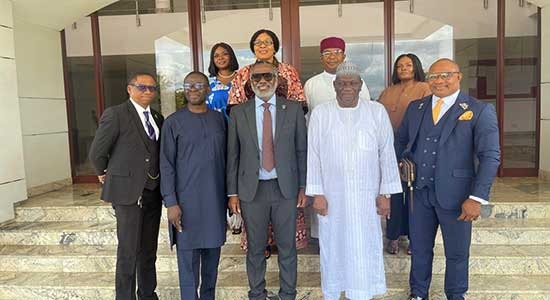ICMC Delegation Visits National Judicial Institute, Seeks Collaboration In Training Judges And Magistrates
 On July 12th, 2024, a delegation from the Institute of Chartered Mediators and Conciliators (ICMC) paid a courtesy visit to the office of Hon. Justice Salisu Garba Rtd, Administrator of the National Judicial Institute (NJI). The delegation, led by ICMC President Godwin Omoaka SAN, FICMC, FCIArb, discussed the importance of mediation in decongesting court cases and sought collaboration with NJI to train judges and magistrates in alternative dispute resolution (ADR) techniques.
On July 12th, 2024, a delegation from the Institute of Chartered Mediators and Conciliators (ICMC) paid a courtesy visit to the office of Hon. Justice Salisu Garba Rtd, Administrator of the National Judicial Institute (NJI). The delegation, led by ICMC President Godwin Omoaka SAN, FICMC, FCIArb, discussed the importance of mediation in decongesting court cases and sought collaboration with NJI to train judges and magistrates in alternative dispute resolution (ADR) techniques.
During the visit, President Omoaka commended NJI for its efforts in promoting judicial excellence and professionalism. He emphasized the global trend of utilizing mediation as a cost-effective and efficient means of resolving disputes, reducing the burden on the court system. The President highlighted ICMC’s successful training programs for magistrates and judges in various states across Nigeria, including Lagos, Ogun, and Ebonyi.
In light of the benefits of ADR, President Omoaka requested collaboration with NJI to further enhance the skills of judges and magistrates in mediation and conciliation. By equipping judicial officers with these essential tools, the Institute aims to facilitate the efficient and effective resolution of disputes nationwide.
As a gesture of recognition, President Omoaka presented an Honorary Fellowship to Hon. Justice Salisu Garba, who will be formally inducted into the Institute on November 26th, 2024, during the ADR Conference and induction ceremony for new members.
The Administrator of NJI expressed gratitude for the visit and acknowledged the significance of alternative dispute resolution in reducing court cases. He welcomed the collaboration between NJI and ICMC, recognizing the mutual benefits it would bring to both institutions.
Hon. Justice Salisu Garba praised ICMC for its remarkable contributions to the field of dispute resolution and urged the Institute to persist in its efforts to raise awareness about the imperative need to embrace alternative conflict resolution approaches.













